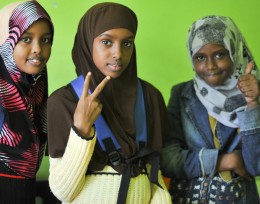 Soon after Fartun Yussuf was born, her native country of Somalia dissolved into civil war. By the time she was 3 years old, her family had left the war-torn nation and immigrated to the United States in search of a better life.
Soon after Fartun Yussuf was born, her native country of Somalia dissolved into civil war. By the time she was 3 years old, her family had left the war-torn nation and immigrated to the United States in search of a better life.
Now in graduate school at the Wright State University Boonshoft School of Medicine, Yussuf is pursuing a Master of Public Health degree and is drawing upon her own cross-cultural experience as she researches the mental health of immigrant women.
In 1993, Yussuf and her family fled Somalia and eventually settled in Columbus, Ohio. Because she was so young when her family left, she doesn’t really remember much about Somalia.
“At times, I am grateful for this. I don’t have to deal with the emotional scars that come from going through a civil war,” said Yussuf, who is the oldest of six children. “Yet it’s frustrating, because Somalia was my home. I don’t have any memories.”
Yussuf grew up in Columbus, where her father runs a small ethnic grocery store and her mother works part time at a production and distribution warehouse.
She was the first person in her immediate family to go to college and the only one to go to graduate school. As an undergraduate at The Ohio State University, she majored in psychology but realized the field was not for her.
“I loved my psychology classes,” Yussuf said. “But after working in a depression lab coding therapy sessions, I knew it wasn’t for me.”
Yussuf explored several health-related careers and considered becoming a sonographer or a physician assistant. But after shadowing for a few days, she realized those fields were not a fit. A job at a nursing home as a nurse aide opened her eyes to the possibility of a career in public health.
“Spending time with the nursing home residents helped me realize that I am passionate about advocating for the health of underserved populations,” she said. “After a lot of research, I realized that I was interested in public health.”
She shadowed at Columbus Public Health and fell in love with the field. “After spending a day there, I knew I had found my career,” she said.
Yussuf met Hibo Noor, a 2012 graduate of the Wright State Boonshoft School of Medicine Master of Public Health Program. She encouraged Yussuf to look into the Wright State program.
After hearing about Noor’s experience and learning more about the Master of Public Health Program, Yussuf knew she wanted to go to Wright State to pursue her M.P.H. degree.
She hasn’t regretted her decision. “The faculty and staff are some of the kindest and most supportive people,” she said.
As part of the Master of Public Health Program practice placement, she was an honorary research assistant at Wolfson Institute of Preventive Medicine at Queen Mary University of London. She spent five weeks learning research methods and conducting a literature review. She researched the mental health of immigrants, especially immigrant women during and after immigration.
“We were curious to find out what was it about being an immigrant woman that made someone more likely to experience a mental health issue,” she said. “Was there anything that could be done to prevent this?”
She has continued her work on the literature review, focusing on the mental health of immigrants and refugee women for her culminating experience — the final research paper in the program.
“I have learned that there are often many overlapping factors that affect the mental health of immigrant women,” Yussuf said.
Acculturation, or assimilation, is a factor that is unique to immigrants, she said. It affects mental health in both positive and negative ways.
“The degree of acculturation to the host society has to be balanced,” said Yussuf, who plans to publish a paper about her research. “Too much acculturation leads to identity and family and cultural issues. Not enough acculturation leaves immigrants dealing with isolation, perceived discrimination and limited language ability.”
Yussuf’s advisor, Cristina Redko praised her research.
“Her tenacity coupled with her extensive cross-cultural experience and sensibility transform her into an excellent candidate to work with the public health of underserved populations,” said Redko, Ph.D., assistant professor in the Department of Community Health and global health director in the Master of Public Health Program.
Yussuf plans to graduate in the summer and is applying to different positions in local and global health organizations to work with underserved populations. Eventually, she would like to return to Somalia to set up regional public health departments there and in other resource-poor nations.

 Milling around
Milling around  Wright State recognizes Nursing Professor Kim Ringo for advancing international student success
Wright State recognizes Nursing Professor Kim Ringo for advancing international student success  Wright State honors graduating students for distinguished doctoral dissertations
Wright State honors graduating students for distinguished doctoral dissertations  Top 10 Newsroom videos of 2025
Top 10 Newsroom videos of 2025  Museum-quality replica of historic Hawthorn Hill donated to Wright State
Museum-quality replica of historic Hawthorn Hill donated to Wright State 